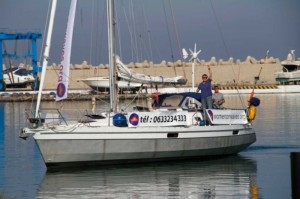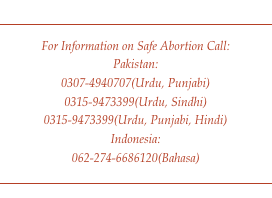Person Of The Month: Women On Waves
This column could be considered a bit of a misnomer this month, because we are not really talking about one person. Instead we are highlighting the work of an entire organization that has worked to challenge abortion laws globally and provide women with access to safe abortion in countries where access to abortion is difficult because of legal restrictions and abortion stigma. Known for their radical and fearless campaigns, this organization is over twelve years old, during which period it has helped several women take ownership of their body and lives. We have the pleasure of working with them and are particularly grateful to them for the role they have played in working with ASAP and our local partners to set up hotlines for abortion in Pakistan, Indonesia and Thailand. I am sure you know them by now, but if not we are happy to present Women on Waves:
 Women On Waves could not be named better. Five times in the last twelve years, the organization has launched ships equipped with abortion facilities, and helmed by feminists to countries where abortion is either strictly banned or highly restricted. They sail into hostile waters, pick up women who need abortions and sail away with them into international waters where laws are not binding.
Women On Waves could not be named better. Five times in the last twelve years, the organization has launched ships equipped with abortion facilities, and helmed by feminists to countries where abortion is either strictly banned or highly restricted. They sail into hostile waters, pick up women who need abortions and sail away with them into international waters where laws are not binding.
The organization was started in 1999 by Dr. Rebecca Gomberts. According to the website, “After completing her training as an abortion doctor, Rebecca Gomperts worked as a physician on board Greenpeace’s ship, the Rainbow Warrior II. In South America she met many women who greatly suffer both physically and psychologically due to unwanted pregnancies and lack of access to safe, legal abortion. Their stories were all heart wrenching. There were women who were raped. There were women who had no means of support. And there were women who were ostracized from their communities. These women and their stories are the inspiration for Women on Waves.”
Women On Waves have sailed into Ireland, Poland, Portugal, Spain and Morocco, where abortion is both stigmatized and highly restricted. While one of the chief purposes of the organisation is to help women who need abortion, these campaigns are also meant to subversively highlight problems posed by restrictive laws, and conservative thinking.
“The aim of the trip was to highlight the hypocrisy of the Irish abortion situation; catalyse efforts to liberalise the abortion law there; to build coalitions for legislative reform; and to test the feasibility of using a ship as a reproductive health clinic,” says the website about the first ship campaign to Ireland in 2001.
 Women on Waves radical not only on water, but also on land and in the virtual world. On September 28 2012, the organization launched an app called Junaio that allowed users to superimpose a sticker with information about medical abortion onto any scene. The famous picture that got the attention of the press was information plastered on the face of St. Peter’s Basilica in Vatican City! The campaign as you can imagine was called “Occupy Vatican.”
Women on Waves radical not only on water, but also on land and in the virtual world. On September 28 2012, the organization launched an app called Junaio that allowed users to superimpose a sticker with information about medical abortion onto any scene. The famous picture that got the attention of the press was information plastered on the face of St. Peter’s Basilica in Vatican City! The campaign as you can imagine was called “Occupy Vatican.”
Then there was Misopolis or the Fake Deisel campaign, whichever way you choose to call it. It was a socialist campaign which questioned the conditions under which factory workers who make clothes are forced to work. In a press release about the campaign, the organization claimed that “a new initiative by fashion brand Diesel to improve working conditions and to provide free abortion pills to its female factory workers could have been an appropriate gesture by Diesel. Diesel is one of the fashion brands that uses production factories that refuse to pay a living wage to their workers, violates their human rights and forces them to work in dangerous and unhealthy conditions.” Misopolis claimed to provide free abortion pills to its female workers in order to set them free. This was a hoax campaign aiming to expose the industry’s human rights violations. The posters created for this campaign are a lot of fun and can still be seen on the website.
 Along with these bold campaigns, women on waves has other services. They have worked with their local partners and with regional networks such as ASAP to help set up misoprostol hotlines. In Asia, there are hotlines in three countries: Pakistan, Indonesia and Thailand. Misoprostol prevents post-partum haemorrage, and can also be used for medical abortion. These hotlines have trained counsellors who can teach the callers how to administer these pills in their homes and perform an abortion without the help of a doctor. Women on Web has an online component, Women on Web, which distributes medical abortion pills mifepristone and misoprostol to women who write to them asking for help. These programmes have acted to promote medial abortion and have successfully helped several women exercise their right to safe abortion.
Along with these bold campaigns, women on waves has other services. They have worked with their local partners and with regional networks such as ASAP to help set up misoprostol hotlines. In Asia, there are hotlines in three countries: Pakistan, Indonesia and Thailand. Misoprostol prevents post-partum haemorrage, and can also be used for medical abortion. These hotlines have trained counsellors who can teach the callers how to administer these pills in their homes and perform an abortion without the help of a doctor. Women on Web has an online component, Women on Web, which distributes medical abortion pills mifepristone and misoprostol to women who write to them asking for help. These programmes have acted to promote medial abortion and have successfully helped several women exercise their right to safe abortion.
Women on Waves has also run into plenty of controversy, as can be easily imagined. The abortion ship met with war ships when it tried to dock at Morocco in 2012. Their images have been blocked by Facebook, and the Diesel campaign enraged the whole fashion industry. But Women on Waves uses this negative press to expose the hypocrisy of conservative movements seeking to work for feminism, human rights and the right to safe abortion in as many ways as they can.
They are our (s)heroes this month! For their unfazed enthusiasm, their grit and courage, and most of all for being leaders in a subversive movement that is hoping to restore power to women worldwide.






